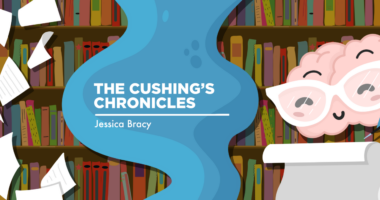4 things not to say to someone with a chronic illness
Here's what a columnist would prefer to hear instead

Having Cushing’s disease has changed me in a thousand ways. In some ways, I’m better off. I’m kinder, I have an amazing community full of chronically ill friends, and I’ve become an advocate for people with Cushing’s. In other ways, my life is worse. I’m in constant pain, I have brain fog all the time, and some days I can barely function.
My illness isn’t a secret, but that doesn’t mean everyone knows about it. On several occasions I’ve felt the need to “come out” about being sick. I have to tell new employees at my jobs and friends of friends. It even comes up when I want to buy something. Before buying my car, for example, I had to know if the trunk was large enough to fit my wheelchair.
If you’re new to interacting with people who have Cushing’s disease or are wondering how to better support a friend with a chronic illness, below you’ll find four common things people say to me — and what I’d prefer to hear instead.
1. ‘When are you getting better?’
Cushing’s disease is a chronic illness, meaning I’ll have it for my entire life. I’m not going to get better. This is one of the most awkward questions I get because I have to respond, “Never.” I have good days and bad days, and I may even see improvement over time, but I won’t ever be completely healthy again.
Here are some questions you can ask instead:
- “How are you feeling?”
- “How are you adjusting to your new medication?”
- “Is there anything you’re struggling with right now?”
2. ‘At least it’s not X, Y, or Z.’
I believe people are trying to make me feel better when they say this, but comparing my journey with others isn’t helpful. Cushing’s might not be terminal, it might not be as bad as what others are going through, but it has made me suffer.
Instead, try to understand my illness and what I’m going through. Educate yourself and learn how to best support those who are struggling.
Here are some alternatives:
- “I’m sorry you’re going through that.”
- “Can you tell me more about Cushing’s disease?”
- “How might I understand your illness better?”
3. ‘What happened?’
I get this question a lot, especially when I’m in my wheelchair. I don’t have an easy answer. Unless you have two hours to sit down and discuss my misdiagnosis, tumor removal surgery, medication trials, and endless symptoms, there’s not much I can say.
Others are perfectly comfortable with this question and even welcome it. However, not everybody wants to share their medical history with strangers, particularly in public.
Here are questions to ask instead:
- “Do you need any assistance?”
- “Do you have any resources that could help me learn more about your condition?”
4. ‘Aw, I’m sorry.’
One of the most common reactions I get is a tilted head and an “Aww.” The person may not intend to be condescending, but that’s how this comment always comes off to me. My illness is a huge part of me, but it’s not the only part. The last thing I need is anyone’s pity. This reaction is especially disheartening when it comes from a co-worker. Power dynamics can make it nerve-wracking to explain how bad this makes me feel.
Here are some alternatives:
- “Thank you for sharing that with me.”
- “I appreciate you trusting me enough to tell me that.”
- “Let me know if there are any accommodations you need.”
We’re all learning every day, and if you’re not around members of the chronically ill community, figuring out what to say — or not — can take some adjustment. Try to remain kind and think through how your words might make others feel. We’re all people; those of us with chronic illnesses deserve the same respect as anyone else.
You can also follow my journey on TikTok and YouTube.
Note: Cushing’s Disease News is strictly a news and information website about the disease. It does not provide medical advice, diagnosis, or treatment. This content is not intended to be a substitute for professional medical advice, diagnosis, or treatment. Always seek the advice of your physician or other qualified health provider with any questions you may have regarding a medical condition. Never disregard professional medical advice or delay in seeking it because of something you have read on this website. The opinions expressed in this column are not those of Cushing’s Disease News or its parent company, Bionews, and are intended to spark discussion about issues pertaining to Cushing’s.







Comments
John Mohar
I have Iatrogenic Cushing’s disease, I also have brain cancer(Oligodendroglioma). Cushing’s has been worse than cancer. I’ve had some serious surgeries caused by Iatrogenesis. I hope people can acknowledge the word Iatrogenesis, it will give you awareness of better health treatment.